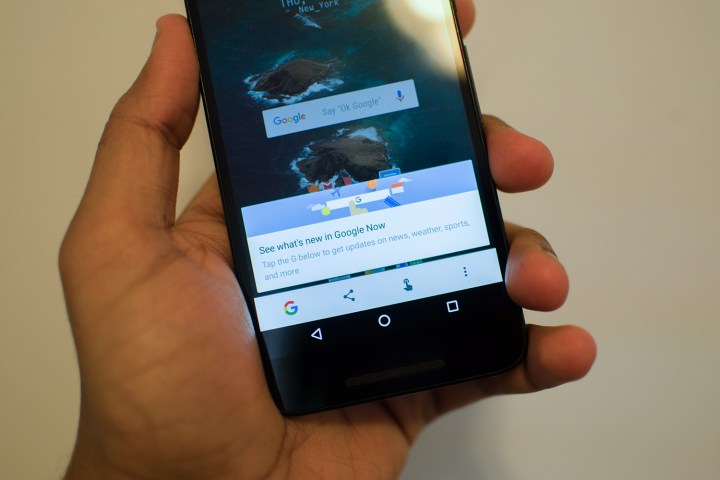
But Now on Tap is evolving, and with the handy new additions some folks are beginning to see, it may become a bit more useful soon: Users who’ve opted to receive beta releases of the Google search app have noticed new shortcuts within Now on Tap’s interface.
Previously, pressing and holding the home button on a Now on Tap-compatible smartphone surfaced one of two screens: the aforementioned search results if Google could make sense of what was on your smartphone’s screen, or a “Nothing on Tap” error message if it couldn’t. In the latest Google app beta revision (version 6.0), though, both are joined by two rows of icons: quick actions –“New reminder,” “Create an event,” “Set an alarm,” “Start timer,” “Navigate to work,” and “Navigate home” — and a link to a Google maps search for “places nearby” — e.g., restaurants, cafes, bars, shopping, gas stations, and ATMs.
The change might be perceived as a not-so-tacit acknowledgement of Now on Tap’s limitations. Now on Tap always required a leap of faith, in a sense: you had to trust that it would will identify the person or object you were searching for. By contrast, Google’s upcoming messaging app, Allo, will feature Now on Tap-like artificial intelligence that can be to a degree tailored: it’ll helpfully suggest searches that might be useful in conversation, but can also be commanded one-on-one to perform specific searches and tasks.
Now on Tap, to be fair, has made steps in that general direction. It gained optical character recognition (OCR) in a recent update, allowing you to select words and terms with precision. And it can now search for buildings and landmasses visible in your phone’s camera app. But if nothing else, the addition of shortcuts to Now on Tap are an indication that Google’s starting to rethink where the service fits in its machine-learning ecosystem. For folks who’ve yet to start using it regularly, that’s probably a good thing.
Editors' Recommendations
- AI is about to make Google Translate a whole lot smarter
- Google Photos now shows more of the photos you want, fewer of the ones you don’t



